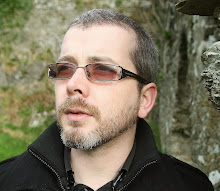
Went on a bit of an Edinburgh binge last month. I read three
Allan Guthrie novels and
Tony Black’s Gutted (more on that one in a future post) in quick succession. Before then, the only Edinburgh-based fiction I’d read was that penned by
Irvine Welsh. That’s right, folks. I haven’t gotten around to Ian Rankin just yet. The Welsh stuff I’ve read (all but the latest three) I enjoyed a lot. But I also remember the mental investment they demanded. Irvine Welsh wrote in a Scottish accent, dropping killer lines like “Mon tae fuck!” in place of “Come on to fuck!” or “Let’s go!” Which was interesting, and helped draw you in to the rhythms of the Edinburgh accent, but at the same time, every single sentence was written in this manner, so it became something akin to reading Chaucer. You practically learned a new language, and sometimes stalled at lines that needed a bit of figuring out.
Allan Guthrie gives us a more accessible look at Edinburgh. Little snippets of slang pop up on the page, but usually in dialogue, and always in a context that makes it easy to decipher. I think Guthrie’s (and Tony Black’s – but as I say, I’ll get to that later) method suits me better. In my opinion, Welsh takes the ol’ sledgehammer-to-the-walnut approach in his p

rose. Guthrie chooses a more subtle route. And this means the reader’s energies can be focussed on the characters and story. Good thing too. Guthrie’s novels are rich in both.
Two-Way Split,
Hard Man and
Kill Clock make up the three works to date that feature the hard-as-nails Gordon Pearce. As a novella solely in Pearce’s POV, Kill Clock has the least characters, but the other two employ a shifting POV in which we get to know a large number of players. And as intricate as the other cast members may be, it’s the simplistic nature of Gordon Pearce that stands out in these books. Before his adventure in Two-Way Split, he spent ten years in jail for stabbing a drug dealer to death with a screwdriver. Why did he do it? His sister died of an overdose, and the dealer had provided the killer skag. And after serving his time, when Pearce’s mother is killed in a botched Post Office robbery, the formula remains unchanged. He gets to work on a plan to kill his mother’s killer.
Hard Man sees the Baxter family in desperate need of Pearce’s help. They need a bodyguard to protect the youngest Baxter from her psycho boyfriend. Unfortunately, Pearce isn’t interested. If the alleged hard man who’s annoying the Baxters has done nothing to Pearce, why should he get excited? Of course, everything changes when something he cares about is threatened. For Pearce, if it ain’t personal, it ain’t his problem.
Kill Clock features Pearce trying to beat the clock to help out an

ex-girlfriend in need. As usual, he’s an unwilling participant in a violent scenario. He has a mission to complete before midnight, but being Pearce, he’s not going to try and outthink the situation. This straightforward protagonist doesn’t think around corners. He runs around them and blatters whoever’s on the other side. Funny thing about Kill Clock; Guthrie tips his hat to the 24 TV series by naming one of the characters Jack Bower. Somebody remarks that this is the guy’s real name. Pearce, deadpan, sees no reason why it shouldn’t be.
This leads me on to another unexpected element of Guthrie’s work. Mired as it is in violence, it’s quite surprising that at times it is also shockingly funny. Before reading Guthrie, I’d heard a lot about the violence, the darkness, the gritty rawness. Nobody really mentions the clever wit. And it’s a shame they don’t, because there are a number of readers out there who’d love this kind of thing who might just skim over it. I’m thinking of those who have enjoyed Colin Bateman at his darkest. Those fans seriously need to
check out Guthrie’s work.
I can’t remember where I read it but if memory serves me, Guthrie once commented somewhere on the internet that Pearce has been through enough torture. He’s unlikely to feature in a future work. So it looks like I’ve read the complete set of Gordon Pearce books, then. It’s a bit of a shame, but like McKinty’s decision to retire Michael Forsythe, I can see the sense in it. Men like Pearce need to lay low or die. They can’t get away with anything else. Bloody trouble magnets, they are.











